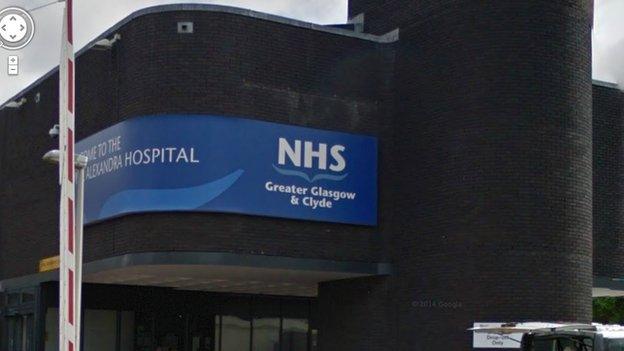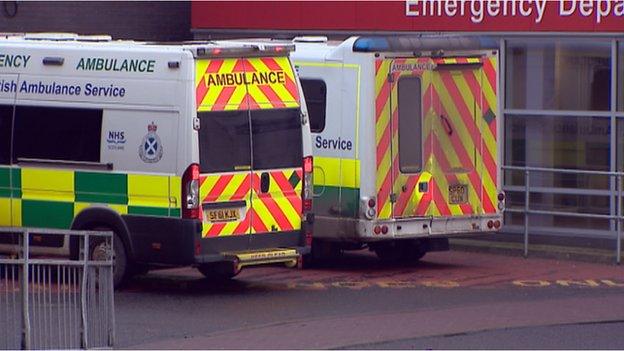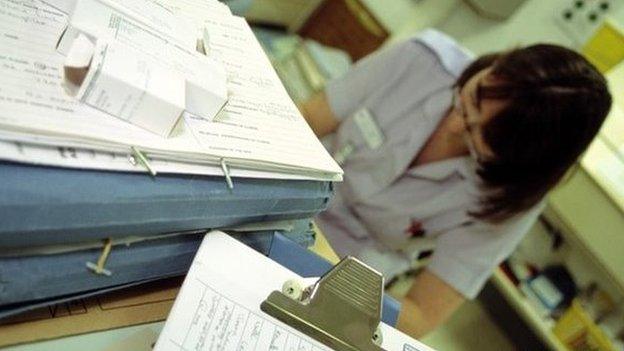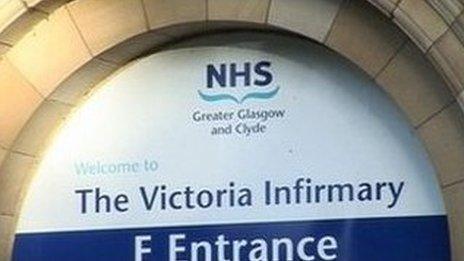Opposition parties claim Scots A&E units 'in crisis'
- Published
Work is under way to cut waiting times at the Royal Alexandra hospital after the Scottish government sends in a team to deal with delays
Opposition parties have said emergency care in Scotland is "in crisis" after ministers intervened at a hospital that failed to meet waiting times targets.
A support team is being sent to the Royal Alexandra Hospital in Paisley where, last month, 84% of patients were treated within a four-hour timeframe. The national target is 95%.
First Minister Nicola Sturgeon said intervening was a "responsible move".
Labour and the Liberal Democrats have claimed the problem is widespread.
Jenny Marra, Scottish Labour's health and wellbeing spokeswoman, said the Scottish government's decision to step in at the Royal Alexandra "confirms what Scottish Labour have been saying for weeks - we have an A&E crisis in Scotland".
'Terrible stories'
She said: "What they can't do is treat this as a localised problem to Paisley. This is a problem up and down the country.
"I was in Fife yesterday and it's a problem there. They really need to be looking at this right across Scotland.
"We have heard terrible stories from Glasgow, from Fife, from Paisley, from up north. The Scottish government needs to realise this is a problem across Scotland."
Ms Marra called for weekly reporting of accident and emergency (A&E) statistics.
The last set of A&E figures were for the period from October to December. From February the figures will be published monthly.
Scottish Liberal Democrat health spokesperson Jim Hume also said there was a crisis in A&E departments across Scotland.
"The SNP government took its eye off the ball and now it is attempting to whitewash the growing crisis in Scotland's A&E units," he said.
"The reality is that the crisis in emergency care is worsening - not improving. Why were the public only told about the extent of the situation facing Royal Alexandra Hospital once the Scottish government sent in an emergency support team?
"People will understandably be concerned that other hospitals could be on the brink of a similar situation."
Opposition comment came after Ms Sturgeon defended the move to send support to the Paisley hospital.
Speaking on BBC Radio Scotland's Good Morning Scotland programme, the first minister said: "Why we've taken the action of sending a support team into the Royal Alexandra Hospital is because we are concerned we're not seeing the degree of recovery in that hospital that we are seeing at other hospitals and that we would be expecting.
'Better practices'
"It's a responsible move, we will have unscheduled care managers from the Scottish government in there to help the management on the ground look at different ways of speeding up the flow of patients through A&E, and doing what is most important of all - making sure patients get the quick access to treatment that they deserve."
Ms Sturgeon said that accident and emergency (A&E) statistics published weeks ago, showed that NHS Tayside's performance for treating patients within the four-hour timeframe was at 98%.
She added: "So, what we need to do is make sure that the better working practices, the way in which patients are being taken through A&E that are working well in some hospitals are being applied in all hospitals.
"And that's one of the things that the support team that we've sent to the Royal Alexandra, will be helping the local management to achieve."
In January, it emerged that one patient at the Royal Alexandra had waited 20 hours for a bed.
The failure to meet the national waiting times target prompted an apology from the head of NHS Scotland on Tuesday.
Chief executive Paul Gray said it had been a "challenging winter" for A&E departments across Scotland.
He said that the support team being sent to the Royal Alexandra Hospital from next week would "help identify issues where they exist and prioritise actions that can be taken to improve A&E performance".
NHS Greater Glasgow and Clyde (GGC), which runs the Royal Alexandra, said it hoped the support team would help "improve on our current challenged performance".
In January, NHS GGC admitted that 2,400 people across the health board area waited more than four hours for treatment over the Christmas period.
Figures published last week showed widespread disparities among health board's in meeting A&E waiting times targets.
- Published10 February 2015

- Published3 February 2015

- Published31 January 2015

- Published8 January 2015
